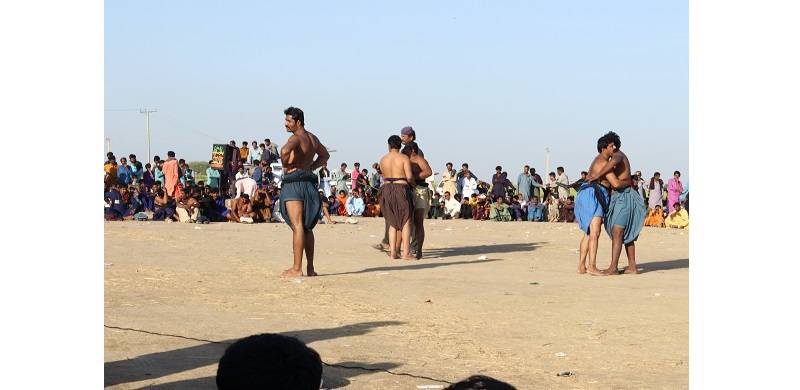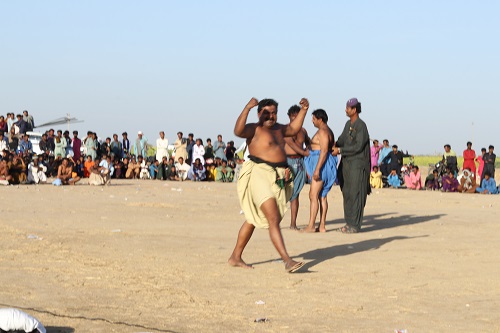
Energetic drum beaters wearing traditional turbans are beating the drums with zeal and zest to attract crowds towards Malakhro, a traditional sport being played on the eve of the annual Urs of Hazrat Ghulam Shah, a renowned Sufi saint whose shrine is located some 30 km from Sujawal.
Malakhra or Malha is also known as Sindhi wrestling and is famous across the province. It is now flourishing in Punjab, Balochistan and some parts of India as well. In Sindh, it is the most watched outdoor sport – played usually on the annual urs of renowned Sufi saints of Sindh.
Amid back-breaking crisis across the country, people with fewer resources pour in to watch their favourite Pehlwan wrestlers giving a tough time to their rivals in the field, surrounded by a large crowd.
Abdul Hameed Saheto, who supervises the matches of traditional and unique sport as a referee in different festivals, says; "Sometimes the matches were played on a hard ground surface – and that leads to the risk of serious neck and head injuries to the wrestlers, as they play this game by putting their lives at stake.” He adds that the local Sindhi wrestlers were so keenly attached to this sport that they usually did not take safety measures.
This is also known as the sport of the common man because it provides pure entertainment to people living even in far-flung areas and away from the hustle and bustle of the city. Since these people do not have many opportunities to get entertained, they eagerly wait for any cultural festival to see noted wrestlers competing with each other.
There are 83 localities in Sindh where malh malakhra matches are held annually – and all are associated with shrines. These also include 17 very important annual malakhra events held on the urs of Hazrat Shah Abdul Latif Bhittai at the fair of Bhit Shah, the urs of Lal Shahbaz Qalandar in Sehwan, the urs of Sain Suman Sarkar and the urs of Hazrat Sachal Sarmast and Sheikh Salamat others.
And yet Jiayandal Khan Laghari, a local wrestler, expresses his despondency over the indifferent attitude of the Sindh Government towards the development of the traditional sport. "We usually feel ourselves isolated while representing our cultural sport that traces its roots some 5,000 years back. This is because of the absence of any official patronage,” he says. He adds that several Pehlwans had left this world amid financial constraints and abject poverty. Moreover, he says that there were many of his fellow wrestlers who did not get any assistance from the government even when they were on their death bed.
Malakhro can involve very technical forms of wrestling. The two wrestlers grapple in a way to overpower each other. The one who succeeds in overpowering the opponent gets warm-hearted appreciation from the frenzied crowd. People present in the crowd mostly give currency notes of 500 to 1,000 in appreciation of these wrestlers. A wrestler, after his victory is announced, celebrates it by smashing his hand on his thigh in a show of victorious aggression and then waves his hands to the massive crowd gathered around him.
 Azam Ali, a diehard young fan of Malakhro, comes daily to watch the matches taking place just at walking distance from his village. “It provides me with a complete entertainment, and I also like the way commentators encourage the pehlwans.”
Azam Ali, a diehard young fan of Malakhro, comes daily to watch the matches taking place just at walking distance from his village. “It provides me with a complete entertainment, and I also like the way commentators encourage the pehlwans.”
A wrestler wears long shalwars with his shirt removed while taking part in the sport to avoid any discomfort while confronting his rival. If a wrestler overpowers his rival, he is declared winner by the referee. Ayaz Shah, a famous local wrestler of Sujawal, says, “People of other provinces usually relate this sport with Kushti but Malah or Malakhro is completely different.”
He further says: “The sport is all about power, energy and strength, and in order , to gain this power and make their body strong, the wrestlers must resort to a healthy diet comprising natural things such as milk, butter, eggs, meat, dried fruit, etc.”
Another wrestler Ali Sher Sheedi says that the love of people for the sport had kept their households running, as they managed to earn a sufficient amount by showcasing their skills at different events and fun-fairs. “It is time that the Sindh Government take further steps for the betterment of this centuries-old sport.”
Malakhra or Malha is also known as Sindhi wrestling and is famous across the province. It is now flourishing in Punjab, Balochistan and some parts of India as well. In Sindh, it is the most watched outdoor sport – played usually on the annual urs of renowned Sufi saints of Sindh.
Amid back-breaking crisis across the country, people with fewer resources pour in to watch their favourite Pehlwan wrestlers giving a tough time to their rivals in the field, surrounded by a large crowd.
Abdul Hameed Saheto, who supervises the matches of traditional and unique sport as a referee in different festivals, says; "Sometimes the matches were played on a hard ground surface – and that leads to the risk of serious neck and head injuries to the wrestlers, as they play this game by putting their lives at stake.” He adds that the local Sindhi wrestlers were so keenly attached to this sport that they usually did not take safety measures.
This is also known as the sport of the common man because it provides pure entertainment to people living even in far-flung areas and away from the hustle and bustle of the city. Since these people do not have many opportunities to get entertained, they eagerly wait for any cultural festival to see noted wrestlers competing with each other.
There are 83 localities in Sindh where malh malakhra matches are held annually – and all are associated with shrines. These also include 17 very important annual malakhra events held on the urs of Hazrat Shah Abdul Latif Bhittai at the fair of Bhit Shah, the urs of Lal Shahbaz Qalandar in Sehwan, the urs of Sain Suman Sarkar and the urs of Hazrat Sachal Sarmast and Sheikh Salamat others.
And yet Jiayandal Khan Laghari, a local wrestler, expresses his despondency over the indifferent attitude of the Sindh Government towards the development of the traditional sport. "We usually feel ourselves isolated while representing our cultural sport that traces its roots some 5,000 years back. This is because of the absence of any official patronage,” he says. He adds that several Pehlwans had left this world amid financial constraints and abject poverty. Moreover, he says that there were many of his fellow wrestlers who did not get any assistance from the government even when they were on their death bed.
Malakhro can involve very technical forms of wrestling. The two wrestlers grapple in a way to overpower each other. The one who succeeds in overpowering the opponent gets warm-hearted appreciation from the frenzied crowd. People present in the crowd mostly give currency notes of 500 to 1,000 in appreciation of these wrestlers. A wrestler, after his victory is announced, celebrates it by smashing his hand on his thigh in a show of victorious aggression and then waves his hands to the massive crowd gathered around him.
 Azam Ali, a diehard young fan of Malakhro, comes daily to watch the matches taking place just at walking distance from his village. “It provides me with a complete entertainment, and I also like the way commentators encourage the pehlwans.”
Azam Ali, a diehard young fan of Malakhro, comes daily to watch the matches taking place just at walking distance from his village. “It provides me with a complete entertainment, and I also like the way commentators encourage the pehlwans.”A wrestler wears long shalwars with his shirt removed while taking part in the sport to avoid any discomfort while confronting his rival. If a wrestler overpowers his rival, he is declared winner by the referee. Ayaz Shah, a famous local wrestler of Sujawal, says, “People of other provinces usually relate this sport with Kushti but Malah or Malakhro is completely different.”
He further says: “The sport is all about power, energy and strength, and in order , to gain this power and make their body strong, the wrestlers must resort to a healthy diet comprising natural things such as milk, butter, eggs, meat, dried fruit, etc.”
Another wrestler Ali Sher Sheedi says that the love of people for the sport had kept their households running, as they managed to earn a sufficient amount by showcasing their skills at different events and fun-fairs. “It is time that the Sindh Government take further steps for the betterment of this centuries-old sport.”

